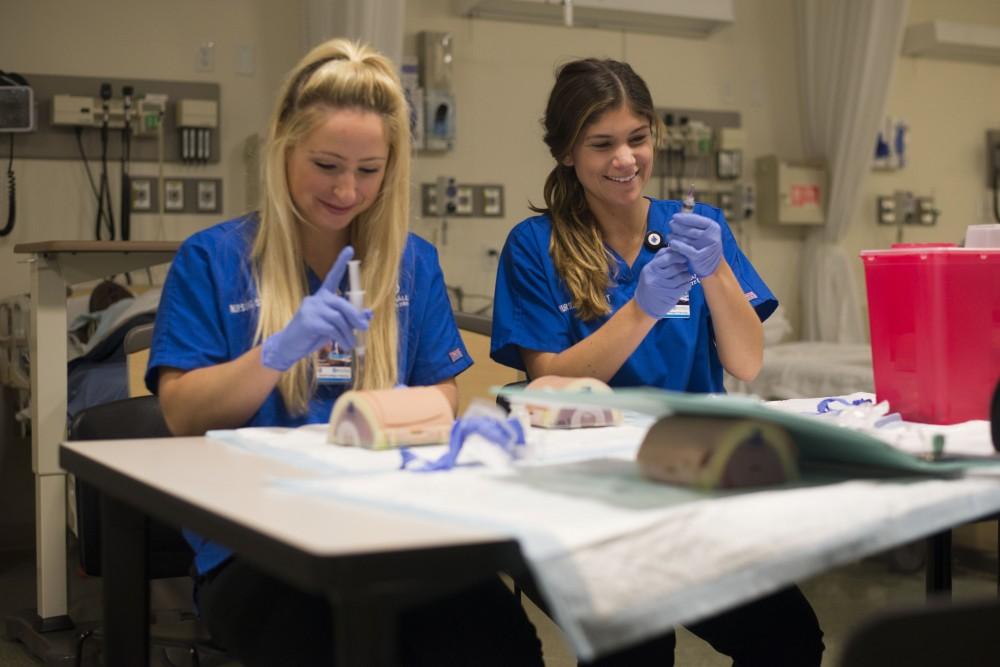Kirkhof College of Nursing receives $332,640 in grants to serve rural communities

GVL / Luke Holmes – Megan Buchman (left) and Madeline Madison (right) practice giving shots to test dummies in the Center for Health Sciences building downtown.
Sep 29, 2016
In order to address the scarcity of readily available healthcare in rural communities, the U.S. Department of Health and Human Services awarded the Kirkhof College of Nursing (KCON) a grant to equip nurse practitioner students to serve in these regions.
The Federal Health Resources and Services Administration (HRSA) grant, totaling $332,640, will be split into individual stipends of $22,000 for 14 different students in the nursing practice doctoral program. Karen Burritt, KCON associate dean for graduate programs and co-author of the grant, said the rest of the money will be put into administration, with a small amount going toward other student activities.
“The purpose of (the grant) is to increase opportunities in rural health,” Burritt said. “In rural areas, there’s a lot of issues with the access to healthcare, and so our nurse practitioner students (are) given the opportunity to be embedded in rural sites either during the third or the fourth year of the doctoral program.
“The idea is to give them a meaningful experience in rural health so that they may choose rural health for their careers.”
In particular, the grant will serve to ease the financial burden of nurse practitioner students who would otherwise have to work more hours at outside jobs.
“(The $22,000 stipend) can be used for tuition, living expenses, so it’s pretty open,” Burritt said. “The students in this program are all practicing registered nurses, so they have a variety of needs, and (these stipends) allow them to back off on their work hours so they’re able to focus on their education more clearly.”
In addition to determining the amount of the grant, the federal government also defined the criteria for which counties are considered rural, thereby marking where the money could potentially be used.
“We have students as far away as places like Charlevoix and Leelanau County up to the north and then down as far as St. Joseph County in the south,” Burritt said. “They can’t be in Kent County, they can’t be in Ottawa County, Muskegon County or Kalamazoo County, which are urban areas.”
The federal government also regulates how much of the grant can be used for individual student stipends.
“($22,000) is the maximum amount the federal government will allow us to give any individual student,” Burritt said. “If we can give them a meaningful number of dollars so they can decrease their work hours and really focus on their studies, they will have a more enriching experience and be able to graduate on time.”
Sandra Spoelstra, KCON associate dean for research and scholarship and co-author of the grant, thinks the nurse practitioner students will gain a new appreciation and understanding of the struggles that members of rural communities face when trying to access healthcare.
“They’ll see how far people have to drive to get to an appointment or how difficult it is for them to get a specialty doctor’s appointment and have a lab test,” Spoelstra said. “They’ll get to see real-life lived experiences in difficult situations and I think it will give them a broader worldview of how to care for people like that.”
Burritt thinks the rural heath communities benefit greatly from this program, too, citing a shortage of providers in rural areas as “a great opportunity for nurse practitioners to really fill a gap in care” and serve a wide range of patients.
“The rural health (communities) have been excited about having these students,” Burritt said. “In small rural communities where people have to travel vast distances to receive care, particularly when they’re not feeling well, new providers in their clinics are exciting for them.”
Burritt believes nurse practitioners are particularly suited to filling these posts.
“Plenty of studies have shown that nurse practitioner care is equal to, or in some cases better than, (the care) that our physician providers provide, as far as quality and outcomes, and it is at a decreased cost,” she said.
Although this particular HRSA grant is only for the fall 2016 and winter 2017 semesters, Burritt hopes to receive more funding in the future.
“(We’re) hoping that we’ll be able to make this a regular grant,” she said. “If we can show successful outcomes with on-time graduation and good student experiences, then our chances of getting funded again will go up.”






















